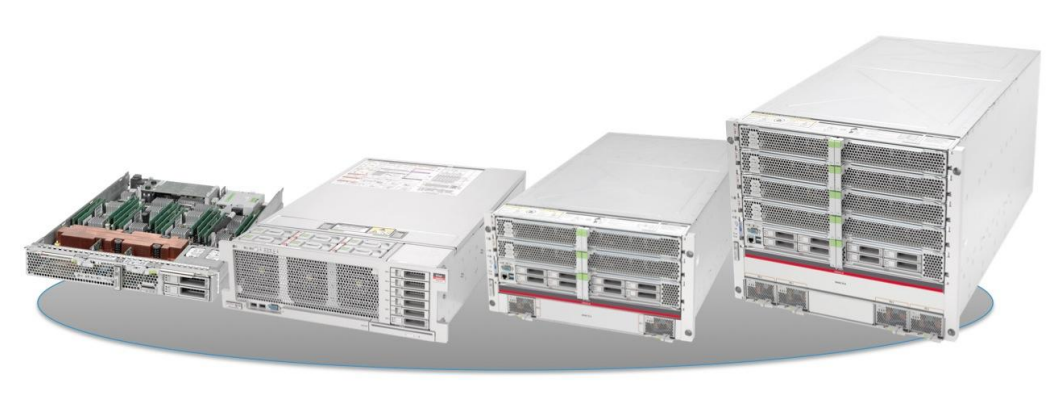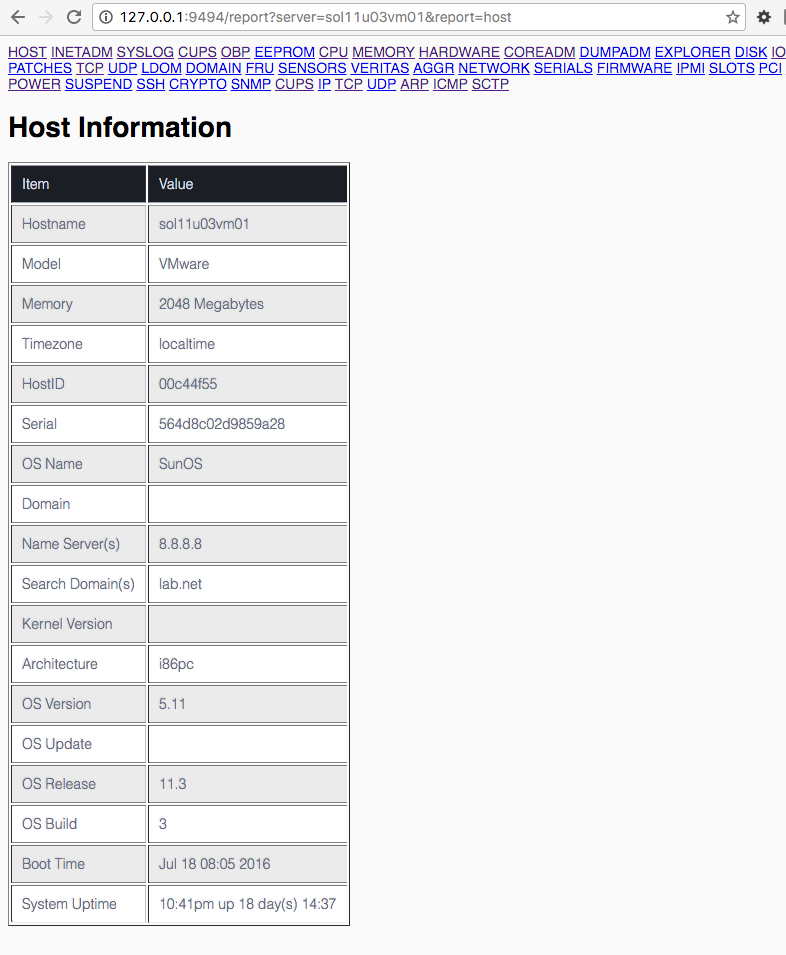Parse, Analyse, and Report on Solaris Explorer Configuration/Content
A ruby script to parse a Sun Oracle Solaris explorer file and extract information. There is some reporting capability being built into the script.
Some of the features include:
- Map IO paths and disk
- Determine part numbers where possible
- Report on firmware versions
- Report if newer version is available
- Security checks for defaults and kernel parameters
- Mask customer information, WWNs, etc
- Output in the following formats:
- Plain console text which can be piped into other applications
- Text table console output
- HTML output
- Wiki output
- A Sinatra based webserver to serve up configs
The default output has changed to pipe (white space delimited plain text).
To get the old style terminal tables, use the table output format type, e.g.:
$ ./parsec.rb --server=hostname --report=all --format=table
To get the html formated output use the html output format type, e.g.:
$ ./parsec.rb --server=hostname --report=all --format=html
To get pdf output, use the pdf format output type, e.g.:
$ ./parsec.rb --server=hostname --report=all --format=pdf
To run the Sinatra based webserver:
$ ./webserver
This will start up a webserver on port 9494
Authentication can be enable by setting the enable_auth flag in webserver.rb:
enable_auth = true
Certificates and keys are stored in the ssl directory:
$ ls -l ssl
total 16
-rw-r--r-- 1 spindler staff 1383 9 Aug 23:27 cert.crt
-rw-r--r-- 1 spindler staff 891 9 Aug 23:27 pkey.pem
If they don't exist the script will try to create them on startup.
Otherwise use the openssl command:
$ cd ssl
$ openssl req -x509 -nodes -days 365 -newkey rsa:1024 -keyout pkey.pem -out cert.crt
The server looks for users in a .htpasswd file in the views directory, eg:
$ cat ./views/.htpasswd
spindler:$2y$05$0Ntm14Sl3Ix.qUSd537V8eUuhM6nJiqSM9mB18Pp5bnbg0ZhtxQAq
The password algorithm is bcrypt.
Password entries can be created using htpasswd, eg:
$ htpasswd -n -b -B spindler test >> ./views/.htpasswd
If you want photos to be displayed, you'll need the Sun System Pictures archive.
To enable photos, clone the archive to a location of your choice and symlink it to the photos directory in the root directory of parsec, e.g.:
$ cd /export
$ git clone https://github.com/lateralblast/ssp.git
$ cd /export/parsec
$ ln -s /export/ssp/images ./photos
The reporting options include:
- Report on Aggregate information
- Report on Everything
- Report on Coreadm information
- Report on CPU information
- Report on Cron information
- Report on Crypto information
- Report on CUPS information
- Report on Disks
- Report on Disk / Filesystem Usage
- Report on Dumpadm information
- Report on EEPROM
- Report on Elfsign information
- Report on Explore information
- Report on Firmware information
- Report on FRU information
- Report on Filesystem information
- Report on Firmware information
- Report on FRU information
- Report on Host information
- Report on inetadm information
- Report on inetd information
- Report on inetinit information
- Report on IPMI information
- Report on IO information
- Report on LDom information
- Report on Link information
- Report on Locale information
- Report on Live Upgrade information
- Report on Kernel information
- Report on Keyserv information
- Report on Memory information
- Report on Kernel Module information
- Report on Mount information
- Report on ndd information
- Report on Network information
- Report on NTP information
- Report on OBP information
- Report on OS information
- Report on package information
- Report on PAM information
- Report on Password information
- Report on Patch information
- Report on PCI information
- Report on Power information
- Report on Security information
- Report on Sendmail settings
- Report on Sensor information
- Report on Chassis Serial information
- Report on Component Serial information
- Report on Services information
- Report on SNMP information
- Report on SPEC information
- Report on SSH information
- Report on SU information
- Report on Suspend information
- Report on Syslog information
- Report on System information
- Report on Swap information
- Report on TCP information
- Report on Telnet information
- Report on Upgradeable slot information
- Report on UDP information
- Report on VNIC information
- Report on Veritas information
- Report on ZFS information
- Report on Zone information
This software is licensed as CC-BA (Creative Commons By Attrbution)
http://creativecommons.org/licenses/by/4.0/legalcode
General Examples:
Hardware Examples:
Software Examples:
Network Examples:
Operating System Examples:
Virtualisation Examples:
Security Information:
Tools:
- Uses pigz if available
- S tar required for Operating Systems other than Solaris
- ImageMagick required for image processing for PDF reports
- libiconv
Required Ruby Gems (required for text reports):
- rubygems
- fileutils
- getopt/std
- pathname
- hex_string
- terminal-table
- pathname
- etc
- unpack
- enumerator
- iconv
Optional Ruby Gems (required for PDF reports)
- prawn
- prawn/table
- fastimage
- nokogiri
- rmagick
Aditional gems required for webserver:
- erb
- sinatra
There is a very basic script to install gems
./utils/generic/install_gems.sh
A base set of firmware information is provided. This information is created using oort. In order to keep this information up to date, a MOS (My Oracle Support) account is required.
In order to work, parsec requires three directories:
- methods
- where the parsec modules are located
- cloning parsec from git will get these
- information
- where firmware and other information is location
- parsec comes with some base information which can be updated using the oort script
- see the Getting started with Parsec wiki
- firmware (under development)
- the actual firmware
- required for some machines to obtain further information
- can be the repository generated from the oort script
- see the Getting started with Parsec wiki

